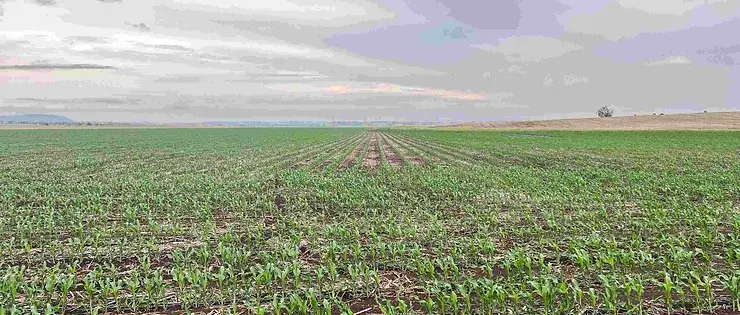Crop rotation has emerged as a highly effective method for improving soil fertility. This traditional farming technique not only optimises the usage of fertilisers but also promotes sustainable farming practices that benefit the environment.
Worm Hit, an organic fertiliser provider, understands the value of integrating crop rotation with their range of products so that farmers reap the maximum benefits from the land. Moving forward, we’ll explore the importance of crop rotation, how it enhances the efficiency of broadacre farming fertilisers, and why it is essential for broadacre farming in Australia.
What is Crop Rotation?
Crop rotation involves the practice of alternating different types of crops in the same field across seasons or years. Rather than planting the same crop year after year, which is called monoculture, farmers shift between crops with varying nutritional needs and root structures. How does this benefit anyone? It helps break pest cycles, benefiting the plants, replenishes soil nutrients, benefiting the fertile soil, and reduces the strain on the land.
In Australia’s broadacre farming sector, typical rotations may include cereals, legumes, and oilseeds, each contributing different benefits to the soil. For example, legumes, such as peas or lentils, can fix nitrogen in the soil, which reduces the need for nitrogen-rich fertilisers in the following season. When combined with organic agricultural fertilisers like those offered by Worm Hit, crop rotation becomes a powerful tool for sustainable farming.
The Link Between Crop Rotation and Fertiliser Efficiency
Maintaining soil fertility and managing the right use of fertilisers is a great challenge in broadacre farming. Growing the same crops in a field over and over can drain the soil of certain nutrients. This leads farmers to depend on using large amounts of chemical fertilisers. However, excessive fertiliser use can lead to soil degradation, water pollution, and diminishing returns on crop yield.
This is where crop rotation comes in. By rotating crops with complementary nutrient needs, farmers can:
- Reduce Fertiliser Waste: Different crops extract different nutrients from the soil. For instance, cereals like wheat are heavy feeders of nitrogen, while legumes, such as soybeans, fix nitrogen into the soil. By rotating nitrogen-fixing crops with nitrogen-demanding ones, farmers can reduce their dependency on synthetic fertilisers and make better use of natural and organic fertilisers like Worm Hit’s range of products.
- Enhance Soil Microbiology: Organic fertilisers play a crucial role in promoting soil biodiversity. When used in combination with crop rotation, they enhance the biological activity in the soil. Microorganisms in the soil break down organic matter, improving the nutrient availability for crops. Worm Hit’s organic fertilisers are designed to enrich the soil’s microbiome, and rotating crops allow the soil to rest and rejuvenate.
- Prevent Nutrient Depletion: Monoculture leads to the depletion of specific nutrients from the soil. For example, continuously growing cereals can deplete the soil of potassium and phosphorus. However, rotating with crops that do not require as much of these nutrients can help balance the soil’s nutrient profile. When supported by broadacre farming fertilisers, such as those offered by Worm Hit, farmers can maintain healthy soil without over-relying on chemical inputs.
- Improve Water Retention: Healthy soil holds water more efficiently, reducing the need for frequent irrigation. Organic fertilisers work with crop rotation to enhance soil structure, helping the soil retain moisture. This is particularly beneficial in Australia’s dry regions, where water conservation is a key aspect of successful broadacre farming.
How Crop Rotation Aids in Pest and Disease Management
Pests and diseases are a constant threat in broadacre farming. Certain pests target specific crops, and growing the same crop year after year can create a breeding ground for these pests. Crop rotation disrupts this cycle by changing the crops that pests feed on, reducing pest populations and the need for chemical pesticides.
For example, root nematodes that affect cereals may be starved out when a legume or oilseed crop is planted in the next rotation. This natural pest management strategy reduces the need for chemical pest control measures, which can harm beneficial organisms in the soil.
At Worm Hit, our organic fertilisers are developed to strengthen plant resilience and work in harmony with crop rotation. By boosting soil health and plant vitality, our products make crops more resistant to disease, reducing the likelihood of crop failure due to soil-borne pathogens.
Long-Term Benefits of Crop Rotation for Broadacre Farming
The advantages of crop rotation in the long run do not only enhance the effectiveness of fertilisers. In a broadacre agricultural setting, rotation contributes to the sustained viability of agriculture as it enhances the conservation of soil and lessens the adverse effects on the ecosystem. Here are some additional long-term advantages:
- Increased Yields Over Time: By making sure the soil remains healthy and fertile, crop rotation leads to consistently higher yields over the years. The efficient use of agricultural fertilisers and the improved health of the soil create optimal growing conditions for crops. With Worm Hit’s organic fertilisers, farmers can be sure that the soil remains nutrient-rich without the need for synthetic additives.
- Reduced Soil Erosion: Crops with different root structures can stabilise the soil and reduce erosion. For instance, deep-rooted crops like sunflowers help anchor the soil, preventing wind and water erosion that can strip away the fertile topsoil. When used in conjunction with Worm Hit’s broadacre farming fertilisers, the soil structure becomes more robust, offering protection against the elements.
- Improved Carbon Sequestration: Crop rotation and organic farming practices also contribute to carbon sequestration, helping mitigate climate change. If you have done a good job of covering your soil with vegetation at all times, then you can enhance the effects of rotation by including cover crops and green manures. In rotation, the atmospheric carbon can be absorbed and sequestered in the soil. Organic fertilisers from Worm Hit enhance this process, promoting soil carbon storage while reducing the carbon footprint of farming.
- Cost Savings: By optimising the use of fertilisers through crop rotation, farmers can save on input costs. Organic fertilisers, which release nutrients slowly, provide long-lasting benefits, reducing the frequency of fertiliser applications. This translates to lower costs and a more sustainable approach to farming.
Incorporating Worm Hit Organic Fertilisers into Your Crop Rotation Plan
Worm Hit’s range of organic fertilisers is designed to complement crop rotation practices in broadacre farming. Our fertilisers are rich in essential nutrients, including nitrogen, phosphorus, and potassium, as well as organic matter that improves soil structure and fertility.
By integrating Worm Hit products into your crop rotation plan, you make sure your soil remains healthy and productive year after year. Our fertilisers are tailored to the needs of broadacre farms, providing an eco-friendly alternative to conventional chemical fertilisers.
The Future of Broadacre Farming: Crop Rotation
Crop rotation has been in practice for years to enable better use of the land, increase the yields of crops and decrease the losses in fertiliser application. In combination with Worm Hit’s organic fertilisers, farmers can achieve sustainability and discover profitable farming practices.
As Australia’s agricultural landscape faces increasing challenges from climate change and soil degradation, adopting crop rotation and organic fertilisers like Worm Hit will save you worries in the future.




